In the realm of computer hardware, the term “CPU bottleneck” refers to a scenario where the central processing unit (CPU) becomes the limiting factor in the performance of a system.
Despite the potential for CPU bottlenecking, the 4080 CPU generally causes minimal bottlenecking, especially at 4K resolution, ensuring smooth GPU performance without significant hindrance.
This Article delves into the “4080 CPU Bottleneck.”
Understanding the 4080 CPU
The 4080 CPU is like the brain of your computer. It’s super smart and can handle lots of tasks at once. Imagine it as the boss giving orders to everyone else on your computer.
It’s much faster and more powerful than older CPUs, which means it can do things quicker and handle more stuff at the same time.
So, if you have a 4080 CPU, your computer will run smoother and faster than ever before.
What Causes CPU Bottleneck?

1. Insufficient Processing Power
This happens when your CPU isn’t strong enough to handle all the tasks you throw at it. It’s like trying to carry too many bags of groceries in one trip – eventually, you’ll drop something.
2. Overloaded CPU Cores
Your CPU has different parts called cores that work together to do tasks. If one core gets overloaded with too much work, it can slow everything down, like having too many cooks in a small kitchen.
3. Poor Cooling Solutions
Just like you need a fan or air conditioning to stay cool in hot weather, your CPU needs good cooling to stay cool while working hard. If it gets too hot, it slows down to avoid overheating, like taking a break on a hot day.
4. Software Not Optimized
Sometimes, the software you use needs to be designed to work efficiently with your CPU. It’s like trying to fit a square peg into a round hole – it just doesn’t work well together, slowing everything down.
5. Background Tasks Taking Over
Your computer might be doing things in the background that you don’t even know about, like updating software or scanning for viruses.
If too many of these tasks happen at once, they can hog your CPU’s resources, slowing down everything else.
Read: Does AMD GPU Work With Intel CPU – Explore Compatibility!
Identifying CPU Bottleneck
1. Performance Monitoring Tools
- Utilize software tools to monitor CPU performance in real time.
- Keep track of CPU usage, temperature, and clock speed.
- Identify spikes or consistently high usage that may indicate bottlenecking.
2. Benchmarks and Stress Tests
- Run benchmarking software to measure CPU performance under various loads.
- Stress tests push the CPU to its limits to identify potential bottlenecks.
- Compare benchmark results to expected performance for your CPU model.
3. Resource Utilization Analysis
- Analyze resource usage across CPU cores and system components.
- Identify any uneven distribution of workload that may indicate bottlenecking.
- Look for consistent high usage or contention for resources.
4. Latency and Response Time Monitoring
- Monitor system latency and response times for CPU-intensive tasks.
- Identify delays or slowdowns in task execution that may point to CPU bottlenecking.
- Measure the time it takes for tasks to start and complete.
5. Task Manager Analysis
- Use the Task Manager or similar tools to identify CPU-intensive processes.
- Check for any processes consuming a disproportionately high amount of CPU resources.
- Investigate background processes that may be contributing to bottlenecking.
6. Comparative Analysis with Similar Systems
- Compare your CPU performance with benchmarks from similar systems.
- Look for discrepancies in performance that may indicate bottlenecking.
- Consider hardware configurations and workload differences when making comparisons.
Read: What CPU Will Bottleneck A Rtx 3060 – Check Bottleneck Risk!
Impact of CPU Bottleneck

1. Decreased System Performance
When your CPU is bottlenecked, everything slows down. It’s like driving in rush hour traffic – you move at a snail’s pace, and it takes forever to get anywhere.
2. Stuttering and Frame Drops in Gaming
Gamers know the frustration of lag and stuttering during gameplay. A CPU bottleneck can cause these issues, making games feel choppy and unresponsive, like trying to play basketball with a deflated ball.
3. Delayed Response Times
Whether you’re typing a document or browsing the web, a CPU bottleneck can cause delays in response times. It’s like pressing the elevator button and waiting forever for the doors to open.
4. Overall System Instability
A severely bottlenecked CPU can lead to system crashes and freezes. It’s like building a house on a shaky foundation – sooner or later, everything comes crashing down.
5. Loss of Productivity
In a work environment, CPU bottlenecking can hinder productivity by slowing down tasks and causing frustration.
It’s like trying to run a marathon with weights tied to your ankles – you’ll never reach the finish line as quickly as you’d like.
How to Address CPU Bottleneck
1. Upgrade Your CPU
If your current CPU is struggling to keep up with your workload, consider upgrading to a more powerful one. It’s like trading in your old bicycle for a sleek new sports car – you’ll get to your destination much faster.
2. Optimize Software and Settings
Tweaking software settings and configurations can help reduce CPU usage and improve efficiency. It’s like adjusting the thermostat to find the perfect temperature – small changes can make a big difference in performance.
3. Improve Cooling Solutions
Invest in better cooling solutions, such as upgraded CPU coolers or improved airflow in your computer case, to prevent thermal throttling.
It’s like installing air conditioning in your home to keep cool on hot summer days – a cooler CPU means better performance.
4. Balance Workloads
Distribute tasks evenly across CPU cores and prioritize resource-intensive applications to alleviate bottlenecking.
It’s like dividing chores among family members – everyone pitches in, and the work gets done faster and more efficiently.
5. Update Drivers and Firmware
Keep your drivers and firmware up to date to ensure compatibility with your CPU and optimize performance.
It’s like getting regular oil changes for your car – maintenance keeps everything running smoothly.
Read: What Is The 4 Pin CPU Power Connector For? – Need To Know!
Will a 7700x bottleneck a 4080 Super at 4k?

Yes, a 7700x CPU could bottleneck a powerful GPU like the 4080 Super, especially at 4k resolution. The 7700x, while a capable CPU, might struggle to keep up with the demands of modern games and applications, leading to potential performance limitations.
To maximize the potential of a high-end GPU like the 4080 Super, upgrading to a more powerful CPU might be advisable to prevent bottlenecking and ensure smoother gameplay at 4k resolution.
The importance of balanced hardware
Achieving a balanced hardware setup is super important. It means making sure all parts of your computer work well together.
If one part, like the CPU, is super fast but the others are slow, it won’t work efficiently. So, it would help if you balanced everything out.
Think of it like a team sport – if one player is amazing but the rest are not, the team won’t win. That’s why balanced hardware is key for a smooth-running computer.
Read: CPU Flex Ratio Override – Upgrade CPU Flex Settings – 2024!
FAQs
1. Will the RTX 4080 bottleneck the intel core i9 12900K?
Yes, the Intel Core i9 12900K is unlikely to bottleneck the RTX 4080 due to its powerful performance and compatibility with high-end GPUs.
2. GeForce RTX 4080 – Bottleneck Calculation?
Calculating potential bottlenecks with the GeForce RTX 4080 depends on various factors such as CPU performance, resolution, and game optimization.
3. Will the Nvidia RTX 4080 Super be bottlenecked by an Intel Core i7 12700K processor unit?
The Nvidia RTX 4080 Super may not experience bottlenecking with an Intel Core i7 12700K CPU, as both components offer high-performance capabilities.
4. RTX 4080 bottleneck?
Bottlenecking concerns surrounding the RTX 4080 depend on factors like CPU capability, resolution, and software optimization for optimal performance.
5. 4080 Bottleneck? – Graphics Cards – Linus Tech Tips
The Linus Tech Tips community discusses potential bottlenecks with the RTX 4080 and explores optimal CPU choices to maximize GPU performance.
6. Best CPU for RTX 4080 Super 2024?
In 2024, the best CPU for maximizing the performance of an RTX 4080 Super would likely be one with high clock speeds and ample core/thread counts.
7. [SOLVED] – CPU bottleneck of an RTX 4080?
Users find solutions to CPU bottleneck issues with their RTX 4080 GPUs, ensuring optimal performance and compatibility for their systems.
8. Should I upgrade my CPU for the RTX 4080?
Considering an upgrade to your CPU for the RTX 4080 depends on factors such as current CPU performance, desired gaming experience, and budget considerations.
Last Thoughts
In conclusion, understanding and addressing CPU bottlenecking, particularly with the 4080 CPU, are crucial for maximizing system performance. By balancing hardware components, optimizing settings, and considering potential upgrades, users can ensure smooth operation and unlock the full potential of their systems.
Read More
- Baldur’s Gate 3 High CPU Usage – Fix Issues Like A Pro!
- Process Lasso Error Setting Process CPU Affinity – Resolve!
- CPU Core Ratio Sync All Cores Or Auto – System Optimization!
- CPU Userbenchmark Bias – Investigate CPU Test Equality!

Hi everyone, Johns Jack here, your approachable tech aficionado! I’m passionate about CPUs and thrive on keeping up with the newest tech developments. Join me as we delve into the dynamic realm of technology! Visit: Techy Impacts

